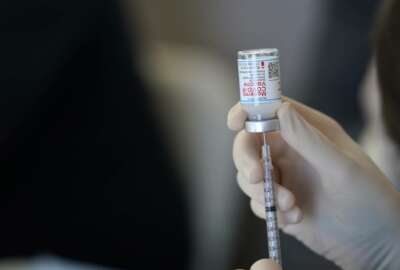
How will that new vaccine policy fare with feds?
The Biden administration's new vaccine policy may not move mountains in convincing more federal employees to get vaccinated. But at the very least, it should give...
Well, things escalated quickly, didn’t they?
Within one week, masks for all are back inside many agency buildings and feds have a new vaccine policy.
Whispers over a vaccine mandate for feds started earlier last week, when President Joe Biden, speaking at the Office of the Director of National Intelligence, said it was “under consideration.” The Department of Veterans Affairs announced one last Monday for its health care workers, the first federal agency to do so.
A day later, the story changed ever so slightly. “Mandate” turned to “choice,” where feds would have the chance to pick between getting vaccinated or face regular testing and other restrictions.
Turns out that’s what the Biden administration announced last week.
Like the rest of the country, feds are mixed about this. Some say they’re not comfortable returning to the office unless they know their colleagues are vaccinated.
For others, well, we got a couple “my body, my choice” comments and emails in reaction to last week’s stories.
Luckily for those who fall in the latter category, you do have a choice, and — at least not yet — it doesn’t force you to choose between the vaccine and your job. Guidance to date on the Biden administration’s new vaccine policy makes no reference to disciplinary action or other consequences for employees who refuse attestation or testing.
Attorneys we spoke to last week say the Biden administration could have legally forced federal workers to make that choice, but perhaps fearing outcry from the employee unions they’re trying to rebuild relationships with, White House officials went another route.
Instead, federal employees, contractors and visitors must attest to their vaccination status or face weekly or twice weekly testing, plus masking, social distancing and travel restrictions.
Understandably, federal employees and their unions have a lot of questions about this new policy, which is truly just that. For what it’s worth, this is not an executive order or executive memo.
Lots of questions, and truthfully, not a ton of answers yet just. For now, we’re left to take a deeper dive through the guidance and FAQs.
Here’s one question that’s still unclear: So what exactly does attestation mean?
Based on initial guidance from the Biden administration, “employees and onsite contractors must sign an attestation confirming their vaccination status.” Those who refuse will be considered as non-vaccinated, and they’ll have to submit to the testing and masking requirements.
Administration guidance doesn’t mention showing a vaccine card as a form of attestation, but multiple attorneys I spoke to last week suggested agencies need a way to check for fake ones. The exact attestation policies are still a little murky, but that might not even be necessary if feds and contractors simply have to check a box — vaccinated or unvaccinated —and sign their names on the dotted line.
You can imagine how some might choose to approach this scenario, if attestation really is as simple as that.
Someone asked me if this new policy applied to members of Congress and their staff members. That one we can easily answer, and it does not. It applies only to executive branch departments and agencies, per Biden administration guidance.
Here’s another one: When does this go into effect?
Guidance on the new vaccine policy doesn’t set deadlines, but it does acknowledge that agencies will have a “reasonable period of time to establish a program for determining the vaccination status of employees and onsite contractors.”
The pandemic has forced us to move more quickly these days, but it’ll take time to set up those testing protocols.
And then here’s another one: If employees and contractors are truly on the fence about getting the vaccine, what about this policy would change their minds if masks are still required for nearly everyone, anyway?
I suppose if you object to the vaccine and work in a frontline job where you might face regular testing requirements as a consequence, sure, maybe testing is a turnoff.
Those testing swabs aren’t exactly pleasant, but it may not be enough to convince the vaccine hesitant, or adamant.
No doubt, agencies want their employees to get the vaccine. Correspondence that we’ve seen from agency leaders to their employees almost always encourages it.
But the Biden administration’s new policy isn’t really about vaccine incentives, or meeting some kind of vaccination threshold within the federal workforce. If more feds choose to get the vaccine because of these new policies, agencies will take that as a win.
The Office of Management and Budget told agencies back in May that vaccinated employees could ditch their masks, but many agencies couldn’t confirm their immunization statuses. That prompted some concern from those who immediately wondered whether unvaccinated employees might exploit the rules, knowing they couldn’t really be enforced.
But now, agencies have permission to ask about their employees’ vaccination statuses, and they have new safety protocols to respond to whatever information they receive.
“Given the different safety protocols for individuals who are fully vaccinated and those who are not fully vaccinated, agencies need to ask about the vaccination status of federal employees and onsite contractors,” the administration wrote.
Of course, willing feds may find loopholes with this new policy too. Some of those loopholes may close as agencies start to implement the new requirements.
And as is the case with any government policy, the devil will be in the details.
Nearly Useless Factoid
By Alazar Moges
In 1780, two doctors invented the first chainsaw as a medical tool to help with childbirths. Now commonly known as a wood cutting tool, the initial use was making the removal of the pelvic bone easier and less time consuming.
Source: Business Insider
Copyright © 2024 Federal News Network. All rights reserved. This website is not intended for users located within the European Economic Area.
Nicole Ogrysko is a reporter for Federal News Network focusing on the federal workforce and federal pay and benefits.
Follow @nogryskoWFED





